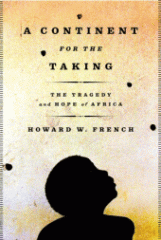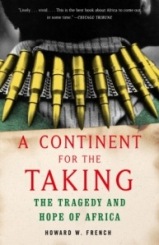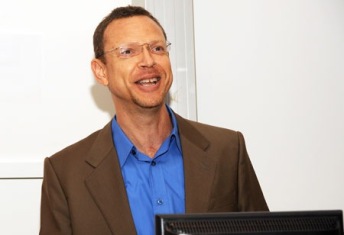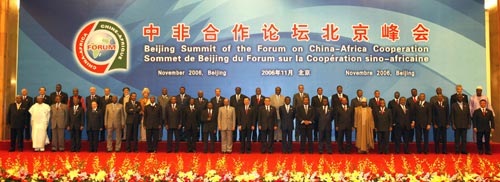Mu-tien Chiou
French, Howard W. A Continent for the Taking: The Hope and Tragedy of Africa. New York: Alfred A. Knopf, 2004. xvii +280 pages. Photographs.
I. Introduction
Howard French’s A Continent for the Taking fits into a reportage genre that seems to characterize the oversea correspondents of American major newspapers. The genre’s African genealogy, which has become increasing bleak in its content, dates back to David Lamb’s tour d’horizon, The Africans in 1983, roughly when the then young H. French started to be infatuated with the continent and its people (3-4).
An African American growing up in the United States, French followed his family to Côte d’Ivoire after college, to work on teaching and writing for many years. Consequently, it is a deeper connection with the continent that distinguishes French from most of his American counterparts. When he assumed the New York Times’s West Africa bureau in 1994, he took the task as a personal challenge and would not be content with a mere ‘fireman’ post that rushes from catastrophe to coup d’état to humanitarian disaster just to quench the First-world media’s insatiable thirst for gory images (25).
His ambition, which turns out to become the thesis of this book, is to raise the issue of the West’s historic dealings with Africa as from the outset an issue of greed, hypocrisy, and ignorance. Africans deserve to be treated like fully human beings. To better voice this call, the author endeavors to delineate the hope and possibility that lie in the myriad cultural strengths of the continent.
II. Chapter Summary
Sent to Mobutu’s Zaire in 1995 to cover the outbreak of the Ebola virus, French soon found himself trapped in a roaring inferno—of poverty, corruption, and disease. His experiences there awakened him to the greed and inequity of the wealthy in colonial history. For him there is a systematic effort on the part of the Westerners to dehumanize the African, since King Joao III of Portugal in the early 16th century (ch.1), King Leopold II of Belgium in the late 19th century (ch.2), to the Clinton administration of United States in the 90s of 20th century (ch.10-11).
Accompanied by these historical facts and cultural observations is the journalist’s ability to catch the readers’ attention by zeroing in on the political hotspots, from the brutal kleptocracy of Abacha in Nigeria (ch.2), the deadly outbreak of Ebola virus in Zaire (ch.3-4), the drug-and-diamond-fueled civil war in Liberia (ch.5, 9), and the epic fall of Zairian tyrant Mobutu (ch. 6-7, 10-11).
When visiting Mali (ch.8) he once found what he would call ‘hope of Africa’ in the grandeur of Djenne Mosque—an indigenous ancient ruin that reveals Africa’s own cultural pride— and in the independent democratic government system. But both of them are fragile and their preservation begs Western countries‘ long term development plan that ceases 1) their exploitation of Africa’s natural and cultural resources and 2) their support for strongman politics, which only fuels oppression and class opposition.
In places such as the former Zaire, it is clearly the strongman politics that has caused such much misery. Within one year after the Ebola outbreak, French was called back to Kinshasa again witnessing the Zairian government’s collapse. It was not hard for him to discover soon that the Zairian rebel Kabila’s uprising was in fact a Rwanda’s Tutsi backed-up genocidal attempt against Hutus. French reserves his fiercest criticism for the New Yorker writer Philip Gourevitch, who presented Kabila, in essence a Kagame regime’s (Rwanda’s) political puppet, as a Lumumbaist Congolese nationalist to the US (232ff.). Gourevitch also packaged the ongoing Tutsi-Hutu vendetta under the analogical disguise of the Jewish Holocaust, with the elite Tutsis minority playing the role of the ‘innocent victims’ from the previous Rwandan genocide in 1994, after the nonintervention of which the US seemed to bear guilt. As a result, when Mobutu fell, Kabila received an undreamt-of consecration/approval transferred in full from him by the US, sealed by UN representative Madeleine Albright’s visit to Kinshasa on Dec. 12, 1997. The Kabila’s succession to the throne ensures that local people’s voice will not be heard and that foreign business/banking and the aristocratic minority can continue their exploitation and dominance over the marketable values and resources through bride and abuse of power. The Clinton administration then turned a blinded eye to the mass massacre that occurred in the Congolese forests, to the extent that the Canadian and French humanitarian force were blocked access to the rescue (231).
As aforementioned, Belgian Congo’s fate is just one of the most singled-out examples of the selfishness and hypocrisy that consistently underlie the mindset of America’s African policy. According to the author, Liberia, Uganda, and Angola are among the African nations that the US owes most to (170-174). But far from rectifying from the past slave trade from Liberia to the undue implementation development plan in Angola, the American’s new strategic vision in Central Africa is based on 1) fighting Islamic fundamentalism in Sudan by instigating Uganda spies and sacrifice Uganda’s stability in their support of Museveni’s dictatorship, 2) securing the lion’s share of Angola’s petroleum reserves for American oil companies, and 3) atoning for its criminal negligence during the 1994 Rwandan genocide (232) by letting alone the cataclysmic reoccurrence of massacre and Liberian civil war alike.
As for French, ‘the continent for the taking’ gave more than what he could bear. He caught malaria and barely survived. Physically he was almost burned out when his work in Africa was about to come to an end. Mentally, he felt and said that he ‘had seen far too much hypocrisy and wrongheaded diplomacy…, too much suffering and neglect, and too many hollow slogans and broken promises… (240). »
French now works in Shanghai, China, still as oversea correspondent for New York Times.
III. Personal Response
The genre of A Continent for the Taking is mixture of journalism, travel notes, autobiography, and cultural commentaries, very well-informed to serve the author’s polemic purpose. He is very open about his passions and allegiances, and his cross-cutting between private and public life renders his account very valuable for those who want to engage the issues of politics, colonialism, neocolonialism, health, and culture in modern Africa.
But on a different note, the book does not support its ‘hope’ theme very well beyond its tragic overtone. Indeed he has mentioned the struggling democracies that have unfortunately dropped off the radar screen in American foreign policy such as Mali (and Botswana), but his sweep is so wide that his scholarship seems too thin to lend itself to systematic argument for hope and possibilities.
IV. Reflection based on other Reading Materials
Early in the book, the author has quoted Achebe’s Things fall Apart as well as others’ on the issue of Africanness and otherness (15, 19). Both French and Achebe seem to be very critical of what Edward Said termed ‘orientalism’ in his same-name classic (Orientalism, 1978), that is, the old-fashioned and prejudiced outsider interpretations of Eastern/African cultures and peoples. Interestingly, similar excoriation about what Christian missionaries have done to Igbo and Okonkwo popped up the table again in Ch.8, where when monumental places like Djenne mosque are suffering erosion and pillage because of Malian people’s destitute of appreciation for its cultural significance and their living in complete destitution. It is the Christian missionaries—their most qualified educators and saviors to life them up from destitution— that indoctrinate this concept cultural self-renunciation hand-in-hand with their literacy program (164-169).
French has in his book’s front page the citation of a Yoruba proverb « Not even God is wise enough », but contrary to his note is a Times article I recently read, widely spread online, entitled ‘As an atheist, I truly believe Africa needs God‘ by Matthew Parris. Basically it is precisely about what Miller and Yamamori entitled ‘progressive Pentecostalism’ in Global Pentecostalism from a nonbeliever’s perspective. Parris notes, ‘far from having cowed or confined its converts, their faith appeared to have liberated and relaxed them’. I believe the real situation is somewhere in between. Africa is still in need of an integrated theological worldview that can hold its people in unity and shape its modern identity. Also, the historical Christianity is at a superior position to offer quality higher education to 1) direct Africa’s human resource, 2) create job market, 3) and prepare African people for the coming of true democracy. I also agree with all the above writers that colonial guilt cannot really motivate the western outsides to build a long-term collaborative relationship with Africans; only love of Christ can.
From 1990 to 2008, Howard W. French reported for The New York Times as bureau chief for Central American and the Caribbean, West Africa, Japan and the Koreas, and China in Shanghai. He is the author of A Continent for the Taking: The Tragedy and Hope of Africa (2004). He is now associate professor at the Journalism School faculty of Columbia University, New York.
Extented reading: Howard W. French commenting on China’s recent involvement in Africa’s developmental affairs
China’s Grand Return: Serving Africa, or Stripping It Bare? (pdf; 77kb)

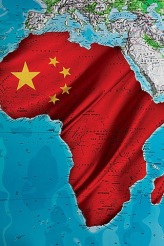 In fact, these images are severely biased. Those who paint this should first think about their Euro-American imperial ancestors.
In fact, these images are severely biased. Those who paint this should first think about their Euro-American imperial ancestors.
